How to Use Brand Values to Drive Unwavering Customer Trust and Commitment
“It’s not hard to make decisions when you know what your values are” – this statement once expressed by Roy Disney highlights the most important function of brand values, that a lot of business owners, unfortunately, tend to forget. When business owners start thinking about values, they usually do it reluctantly, under the pressure from consultants, marketing directors, and competitors. They don’t realize that brand values aren’t a superficial marketing term, but a key to the brand’s success.
The business community turned its attention to brand values almost twenty years ago, when Steve Jobs recognized the immense power of values in driving brand awareness and loyalty. In the famous speech, marking his return to Apple, Jobs draws a parallel between the company’s mission and brand values. Apart from emphasizing the meaning of values to customers, Jobs also shares the two questions he started with to bring the company back to its roots:
- Who is Apple?
- What does Apple stand for?
Obviously, Jobs recognized that brand values can drive decision making in addition to earning customer trust. Yet, that third part of the speech is often ignored. As a result, business owners come up with brand values for the sake of customers or competitors, but not for the sake of the brand itself. Brand values created that way end up being meaningless, unable to drive real change in the organizational culture and in the customer mind.
We know that sometimes it’s a struggle to come up with brand values that really mean something to your ideal customers so we’ve developed three different ways of working with us to help you build your brand, depending on your preferences, so if you’d like us to:
- Build your brand for you – find out more here or get in touch [email protected] or ring +353 1 8322724
- Empower you to build your brand – check out the Persona Brand Building Blueprint™ Mastermind here. This is a two-day intensive where you work on your brand with us codifying and mapping out your brand strategy for business growth. Alternatively, join our half-day Branding Accelerator Masterclass for a fast-injection of brand building essentials
- Want a DIY solution? check out our how to build a brand eprogramme here
So how does one go about creating meaningful brand values? Let’s first understand what brand values are.
What are Brand Values?
As humans, we all have values that guide us through life. We acquire values throughout our life time starting from childhood. Values can also change as we learn, experience new things, and encounter different cultures and people. There is a large body of research concerning personal values, but it can all be summarized as follows [1]:
- Values are beliefs, but they represent emotions, not ideas
- Values are always attached to motivational goals, meaning they inspire action
- Values aren’t specific. They represent a generalized understanding of actions and situations
- Values are standards and criteria, that people use to navigate the world
- Values aren’t equal. There is a hierarchy of values and that hierarchy differentiates people from one another
Brand values are no different to human values. They guide what you will do and won’t do as a brand. Brand values are the pillar that the brand is built on even before you have a product or service. Just like personal values, brand values can be acquired and changed, but they need to be practised in order to have real power.
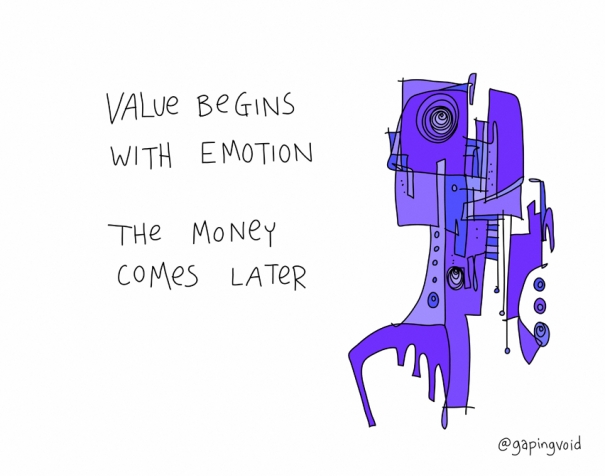
Image via ©Hugh MacLeod @gapingvoid
Why Brand Values are Important
Brand Values have different functions. First of all, they define acceptable and unacceptable behaviour. Brand values help brands operate in a highly diverse and social environment, where success depends on how well you’re understood and accepted as a brand.
Secondly, brand values guide decision making in the organization. The beauty of having brand values is that you cease to be a malleable soft mass of indecisiveness, and become a laser-focused entrepreneur that sticks to his or her vision. Brand values have the power to limit and expand your vision at the same time. You’re restricted by your values, but they make decision making the most straightforward and effective experience, which enables you to move faster towards your goals.
Related: CEO Brand Leadership, How Vision Drives Brand Growth
Lastly, brand values engage customers on a deeper level. Rather than form a surface connection, brand values instil love into customers’ hearts. Again, think about it in simple human terms. We’re attracted to others based on superficial looks and behaviour, but we fall in love with who the person is at their core.
Love as a human emotion is triggered by the desire to give [2]. But we only feel compelled to give when the two conditions are met:
- When we have respect for someone, and
- When we feel safe, in other words, when our core purpose and values aren’t violated.
Related: Purposeful Brands, Why Customers Are Prepared to Pay More
On the emotional level, customers are drawn to brands that promise certain features and benefits, however, customers will never act on their needs and wants unless they feel entirely safe. In that regard, brand values tell customers that it’s safe to move forward with a purchase by showing brand and personal values alignment. That’s how love is formed and, as you might have guessed, love goes beyond one-time purchases — it guarantees repeated purchases.
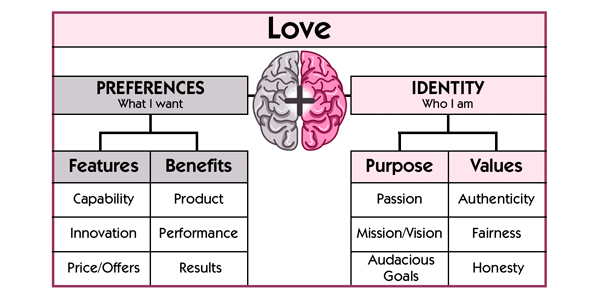
Want to become an irresistible brand that creates an instant love and connection? Work on your brand values during one of our Transformational Workshops, like the Persona Brand Building Blueprint™ Mastermind where we take a deep dive, step-by-step on how to build your brand. You’ll discover and apply the systems and methodologies employed by some of the world’s greatest brands on your brand. In fact, because the Persona Brand Building Blueprint™ is a fast-track programme you’ll leave the workshop with your brand strategy fully mapped out and documented ready for implementation to grow your business.
Or if you’d like us to create a bespoke plan for your brand, working with you personally, then get in touch. Our Brand Strategy service is tailored to each client individually and uses the Perona Brand Building Blueprint™ System. It provides difference and distinction for your brand so it stands out and helps your brand ultimately resonate with your ideal customers because this is what enables you to increase sales.
Staying Aware of The Big Picture: Brand Values in The Frame of Brand Identity
It’s important to remember that brand values are part of brand identity. Brand identity is an overarching umbrella term, that includes a brand story, mission, values, purpose, positioning, voice, look and feel. Brand values along with purpose shape the internal world of the brand, while a brand story, mission and positioning define how the brand relates to the outside world.
Related: Boring Brand? How To Create a Unique Brand and Market Positioning
You can’t expect brand values alone to bring you success. Brand values are an important part of a complex equation, that is a sum of multiple parts. This makes perfect sense when you look at the report from Havas Media Group, Meaningful Brands [3]. The report defined the term “meaningful” via 52 different attributes, which shows that customers think of brands in a variety of different dimensions, including functional benefits, adherence to social norms and the ability to form an emotional connection. Building a carefully thought out brand identity, where every piece adds depth and colour to the picture, is, therefore, a must-do task for every business owner.
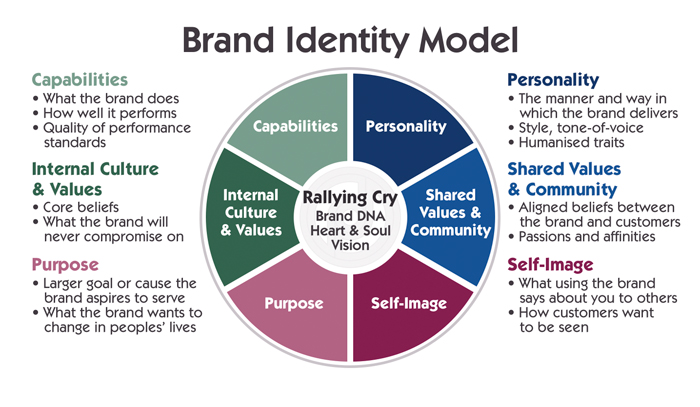
Companies with effective Brand Values:
While most companies and brands have established brand values, they don’t always speak to the audience. In other words, they are too generic and meaningless. In order to understand how to identify and develop truly meaningful values, let’s take a look at some of the brands that are doing it right:
Founded in 2011 by Jessica Alba, the Honest Company is a consumer goods company, that provides baby, personal care, and cleaning products. Here are the 8 brand values that the company is built on:
- Create a Culture of Honesty
- Make Beauty
- Outperform
- Service Matters
- Sustain Life
- Be Accessible
- Give Back More
- Fun!
True to its mission and values, the company creates beautiful advertisement videos where these values are emphasized.
Business owners often struggle with defining values, because they think that values can only be expressed in single words. But, in fact, it doesn’t matter how you express your values, what matters is the message enclosed in the word, phrase, or sentence.
Related: 4 Reasons Why Your Business Profit Starts With Your Brand Mission
Lendio is a software platform that connects small business owners with funding companies and sources. Lendio outlines their 6 core brand values on the website:
- Own the outcome
- Profitable to others
- Life at Mach 10
- No roadblocks
- Lendio is its peeps
- Moxie
As you can see, the company has a good mix of values – some of them hint at employee cultures, others show dedication to the customer, and some are simply the expression of the brand’s personality.
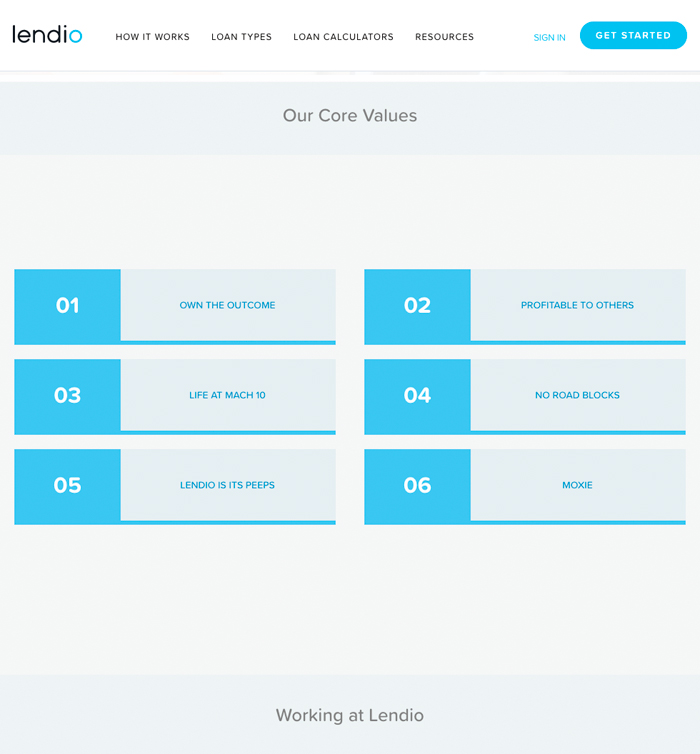
Image via Lendio
Related: Personality Matters, Bringing Your Brand to Life to Grow Profits
Goulet Pen is an online store selling supplies to fountain pen enthusiasts. The company dedicated a whole video to explaining it’s brand values to the audience:
Goulet Pen values are as follows:
- Work hard, be honest, be flexible
- Trust is our currency
- Work as a team
- Empower through education
- Express gratitude
- Serve with passion
- Care
At first glance, these values sound superficial. But the company provides a detailed description of each value in the video. When you know what the company stands for but struggle to come up with powerful and succinct phrases to describe your values, using additional ways to present the information can help communicate the values to your audience and employees. The Goulet Pen values may need some additional work, but the company’s creative approach to delivering the message to the customer deserves recognition.
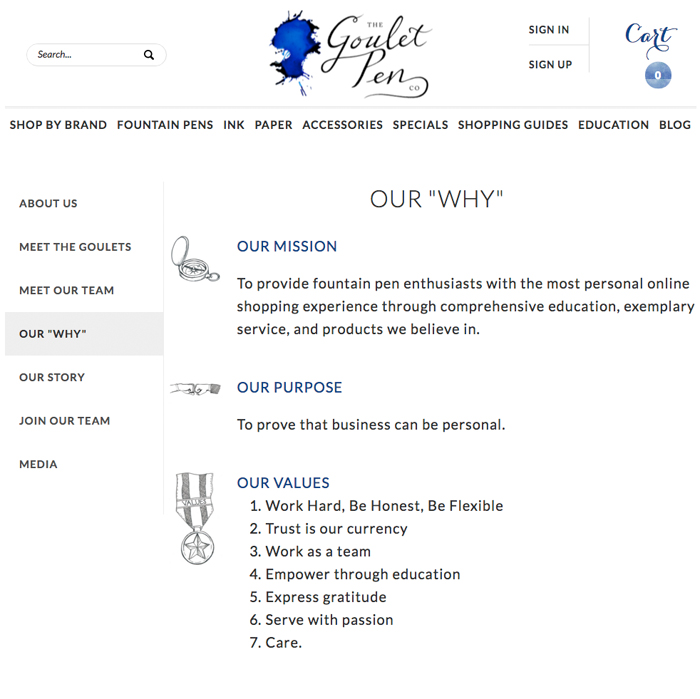
Image via Goulet Pen
Types of Brand Values
Brand values are often called core values [4]. Only a few people know that core values are not the only type of values that exist. Understanding the difference between types of values will help you avoid picking trivial values so you can focus on refining core values only.
Core Values
Core values are principles that lie at the core of a brand’s personality. They are inherent values that can’t be compromised. Core values are the source of a company’s uniqueness. They ensure respect and admiration from others all the while creating a deep emotional connection.
Related: Are Your Brand Values On The Money? They’re Critical to Your Profitability
Aspirational Values
Aspirational values are those that the company is striving to acquire. They are future-oriented values that the brand lacks now but needs to manifest in order to achieve set goals. These values are often put in place when the company is expanding to the new market or changing the current strategy.
Permission-to-play Values
Check out this video from Patrick Lencioni, where he talks about how core values are often substituted by permission-to-play values.
Permission-to-play values are the minimum moral requirements that the company places on employees and partners. Since these requirements are often dictated by the culture or the market, permission-to-play values tend to be similar across companies operating at the same location. Replacement of core values with permission-to-play values is the most widespread mistake that the business owners make. Permission-to-play values don’t differentiate you from competitors, which makes value creation exercise a futile experiment.
Related: The Impact of Company Brand Culture On Driving Performance and Increasing Sales
Accidental Values
Accidental values appear out of nowhere following the company’s hiring and team building efforts. These values are instilled by employees unintentionally. Accidental values often reflect team leaders’ values. While some accidental values can be beneficial to the company’s success and team spirit, the executive team needs to monitor these values consistently, as they might come into conflict with the core values.
5 Steps to Choosing and Validating The Right Brand Values
As we established earlier, the number one mistake that business leaders and owners make is they choose meaningless brand values, thus restricting the company’s growth and complicating decision making. But how does one come up with core values, that truly reflect the brand’s personality and vision? Here’s a step-by-step plan for core values creation:
Discover Your Values
The first step involves deep research and reflection. Take some time to understand what your brand stands for or what you want it to stand for. Here are the three commonly used methods for identifying brand values:
Method 1: Identify Your True Values
Make a list of what’s important to you. This is the most dangerous approach because we tend to choose anything that comes to mind first, but most likely these values come to your mind because you saw your competitors using them.
Another danger lies in the human tendency to idealize things. You might choose values that sound great on paper but have nothing to do with your brand. Customers don’t want perfect brands, they want brands that can speak to their hearts. That’s why it’s important to use a combination of brand creation methods.
Method 2: Define Your Dealbreaker
Think about a situation that you never want to be in as a brand. What will you never compromise on or do in business? See if you can remember instances when you were disappointed with another brand. Then come up with the value that represents the opposite behaviour. If you as a business leader or owner are opposed to certain behaviour, it’s a sure-fire sign that an opposite value is true to your brand’s character.
This method works because we often experience negative emotions more intensely than positive ones. You might not be able to define your values, but you certainly know what kind of behaviour you won’t tolerate.
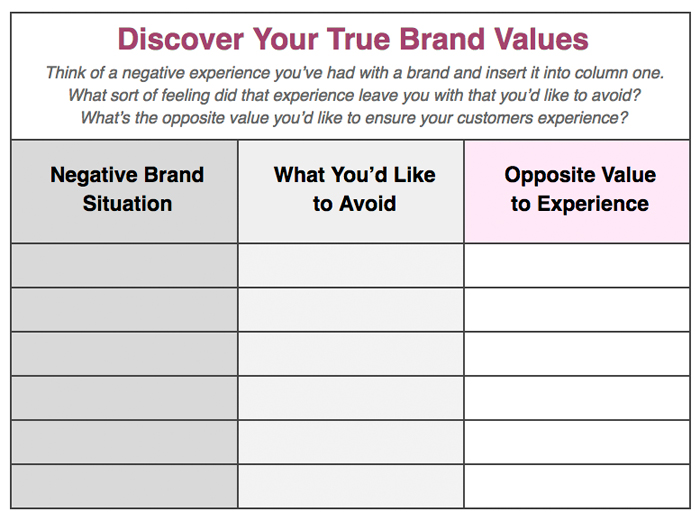
Method 3: Significant departure from how your competitors choose to act and how customers expect the industry to behave
Sometimes brand values are used to define the brand against competitors[5]. In that regard, they become intertwined with the company’s mission and vision. This method is effective if your competitors are engaging in dishonest tactics or if competitors’ behaviour goes against their proclaimed values.
Assess Your Values
Once you have dug deep, reflected and brainstormed a list of values, choose 3-5 to focus on. These could be values that showed up multiple times during your research process or the values you feel most strongly about.
You then need to validate your chosen values by running them through a list of testing questions such as:
- If you were to start a new business, would the chosen values still stand true?
- If the executive team changes, would the company still adhere to these values?
- If you’re forced to change your values under the pressure of external events, would you do it?
Keep it Consistent
Core values should never be compromised. You have to be consistent with your values no matter what. Consistency means choosing one course of action over the other even if it’s a more difficult path. Consistency is also about sticking to your values even if they go against everybody’s expectations.
On a more surface level, consistency is weaving your brand values into every branding and marketing asset, message, and customer interaction. In my experience of over 20 plus years working with both large enterprises and small businesses nationally and internationally, a lack of consistency is one of the areas most commonly at fault in SME/SMB businesses.
Unfortunately, a lot of business leaders don’t realise is that inconsistency breeds distrust and fundamentally if a prospect does not trust your brand they will not buy from you. Trust is the life-blood of every brand so you must do everything in your power to cultivate, nurture and grow customer trust through brand consistency. All your brand identity assets such as logo, font, images, social media profiles must be consistent with your core brand values.
Instil a Value-Driven Employee Culture — make your values real every day in everything you do
Frequently business owners create brand values, put them on the website, and then forget about their values completely. But for brand values to have a real effect on the organization and drive success, they need to be put at the forefront of everyone’s mind every day.
Related: The Age Of Internal Branding And Selling It From The Inside Out
First of all, make sure your brand values are visible to everyone in the company and in the market. Educate and brand induct employees on the core values and what they mean. Place posters and corporate materials in meeting rooms and at gathering points. Communicate brand values at presentations, company parties, and on the internal web portal.
Secondly, adjust your hiring strategy and look for candidates who share the company’s values. It’s a lot easier to find someone who already shares your brand values than try to implant values into employees’ minds. Values are deeply ingrained in human personality, so acquiring new values and changing the old ones is a long and onerous process.
Related: Use Psychology in Your Brand Strategy to Create Irresistible Brand Experiences and Increase Sales
Lastly, act on your values. Don’t just create external messages based on values, but encourage internal company initiatives that showcase your dedication to values. For example, if your value is to “have fun” emphasize it with regular happy hour gatherings and team building events. Another way to encourage employees to authentically live by the company’s values is to reward value-driven behaviours. The encouragement can come in the form of company-wide announcement, appraisal or “employee of the month” recognition.
Making Brand Values a Part of The Customer Experience
Ensuring employee values are aligned with customer values is critical because employees are the face of the company and living embodiment of the brand. Through employee interactions with the customers, you communicate your brand’s personality including brand values.
Related: 5 Remarkably Heartfelt Brand Personalities Winning Buyers at Christmas
Another way to make brand values a part of customer experience is to emblazon corporate values across all media. This implies creating advertising materials in line with your values and running corporate brand campaigns instead of product campaigns.
Brand values can also be communicated via the company’s actions. For example, as a brand, you’re expected to stand by your values during the times of social and economic challenges. When Howard Schultz kickstarted the campaign in support of same-sex marriage, he led by example and his instinct to support the cause was triggered by brand values. By doing so Schultz risked alienating customers opposed to same-sex marriages, but as he went on explaining – “Not every decision is an economic decision”. The Starbucks leader was acting according to the brand’s values when the frenzy around the social issue has reached its peak.
Final Word
Brands can connect with customers on a values level. But that’s not the only reason to create brand values. As part of brand identity, core values drive positive change in the organization and aid clarity in decision making. While brands can achieve great results by presenting functional and emotional benefits, brand values allow for a deeper connection that makes people fall in love with the brand.
Not all brand values are equal. From four types of values, you need to strive to define your core values first. Core values can be expressed in a number of different ways but you should choose phrases and words that don’t allow for uncontrolled interpretation. Lastly, brand values only become values when they’re consistently communicated and lived by internally and externally.
We know it takes time and can perhaps appear a little bit onerous to create your brand values so if you’re a busy business leader, manager or entrepreneur we can make the process easier for you with our personalised Brand Strategy creation service. Your brand strategy is the discipline of planning, of setting a course for the long term to achieve specific brand goals which are aligned with the business plan. We create brand assets that resonate with your ideal audience including a brand story, mission, values, positioning, and look and feel.
Alternatively, join us at one of our Transformational Workshops, where we take a deep dive, step-by-step on how to build your brand. You’ll discover the systems and methodologies employed by some of the world’s greatest brands, apply them to your brand so you leave with your brand strategy fully documented and ready for implementation to grow your business.
In fact, the Persona Brand Building Blueprint™ Mastermind is the perfect fit for you. This is a two-day fast-track brand building intensive, shared with a small group of like-minded peers, where you work on your brand with our leadership to completely re-evaluate it and map it out for growth from the ground up. Discover more here.
Question to Ask Yourself:
- What core values do you hold as a person and as the visionary and voice behind your brand?
- If you sell or leave the business, what values you would still live by?
- What are your key employees’ personal values? Are they aligned with your brand be that company, product or service?
- In what circumstances will you say “no” to a customer? What’s your brand dealbreaker?
- What stories inspire you? What are the values communicated by those stories?
- Having re-evaluated your brand in the context of your brand values, do you think it needs brand revitalisation or perhaps rebranding so you can make your brand values stronger and more relevant to increase sales?
Sources:
- http://essedunet.nsd.uib.no/cms/topics/1/1/1.html
- https://www.brandingstrategyinsider.com/2017/05/brand-values-engage-consumer-brain.html#.Wmmfvahl_IU
- https://www.cmo.com.au/article/620933/why-it-important-your-brand-meaningful-your-customers/
- https://hbr.org/2002/07/make-your-values-mean-something
- https://www.brandingstrategyinsider.com/2016/03/choosing-the-right-brand-values.html#.WntuQOjFLIV

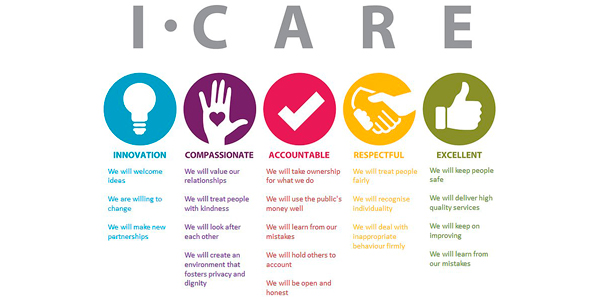



Leave a Reply
Want to join the discussion?Feel free to contribute!